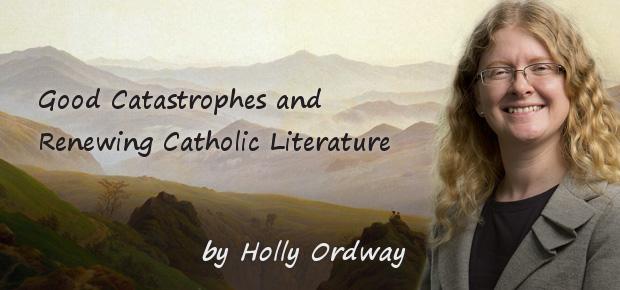
Eucatastrophe: in a word, this is what we need today, for a renewed, vibrant, and compelling Catholic literature.
The word, coined by J.R.R. Tolkien in his great essay “On Fairy-stories,” means “the good catastrophe”: the unexpected happy ending, the turn from sorrow to joy. Tolkien’s own great work The Lord of the Rings has precisely such an ending, but the significance is deeper: Tolkien writes that the eucatastrophe of history is the Incarnation and the Resurrection of Christ. We respond to the happy ending of a story with joy because it echoes the story that God Himself is creating: the story that began in the Garden and—after darkness and pain—will bring us to the New Heavens and the New Earth.
Tolkien (like his friend and fellow Inkling C.S. Lewis) could show a convincing and attractive vision of the Christian faith, precisely because his faith, and thus his literary vision, included the dark but knew that the light triumphs. It is because he recognized the darkness that Tolkien could show a convincing Joy: his work rings true. The Lord of the Rings is deeply Christian (like the Narnia Chronicles, though in a different way).
We do not have enough true joy in our literature today. Popular literature tends to the bleak and dystopian, and is morally unmoored; and even the most widely known modern Catholic writers—Flannery O’Connor, Walker Percy, Evelyn Waugh, and Graham Greene—are more dyscatastrophic than eucatastrophic. There is an important place for satire, for a vision of the fallenness of the world, and for the literature of ‘doubting faith’: these authors speak profoundly to some readers and we should be grateful for their work.
But this is not the whole story: the Catholic faith is the fullness of the truth, and the truth is that our story has a happy ending.
What, then? Christian literature across all traditions will flourish when we have more writers who are committed to Christ and serious about their art. And, speaking more directly, we need more Catholic authors who are faithful and devout, accepting all that the Church teaches and striving to live it out; who have the eucatastrophic vision that is rooted in and nourished by the Church; and who have the talent and dedication needed to express it well. Can we hope for such a literary renewal in the coming years? I think we can.
[Ed. note: We are very happy to have Dr. Holly Ordway, Ignatius author and professor of English, bring some reflections on Tolkien and the renewal of Catholic literature to the Novel Thoughts blog. This is the first in a series—stay tuned for more! Update: Here are Part 2 and Part 3.]






Christopher John Hagen
January 9, 2015 at 4:51 pm
From whom can we hope to see such a literary renewal?
Montague (C. M. Boyd)
January 10, 2015 at 1:12 am
I’ve heard of a thing called the Superversive Literary Movement. It’s not entirely a “thing” yet, but I hope it will be taken up in all quarters of the artistic world.
Dan at Ignatius
January 12, 2015 at 1:24 pm
Christopher: One good place to start finding them is right here, not just the Ignatius authors but those we talk about in the blog posts. Try perusing the posts tagged with ‘Catholic literature’, like this one. (Click here to see them.) Also, back when we started this, I looked around and tried to give a roundup of Catholic presses publishing fiction, which we have to hope find the kind of writers Holly speaks of. See “The New Catholic Literature Revival, Or Something Like It” for more. But many of the posts by Dorothy Cummings McLean I find very good this way.
Dan at Ignatius
January 12, 2015 at 1:28 pm
Oh, and Montague: Interesting! Googling around a bit. John C. Wright and co. are voices to hear, certainly.
Michelle B
January 12, 2015 at 11:15 pm
I’m anxious for the rest of the series to find out from whom we might expect ‘euchatastrophe’. I’ve been more and more discouraged by the lack of it in recent years.
Kate Casper
January 21, 2015 at 12:41 pm
Wonderful discussion. One Catholic novel in our midst with a eucatastrophic ending is my husband’s “Everywhere in Chains”. A reviewer explains that although “the title suggests a story filled with dark imagery, a violent plot, and more than a bit of suffering…Casper’s cast of characters…are like the people you have met in your own life, who, through God’s benevolent hand, have had a profound effect on your view of the world. The kind of people that give you hope even when you are surrounded by vestiges of evil…. I cried when the book ended….your spirits will be uplifted for some time to come.”
In it’s original form, the novel’s last words were:
“Somewhere a light was shining.
Somewhere a candle was lit.
Somewhere a prayer was said.
The prayer was a giving, not an asking.
The meaning of the prayer was love.”
These were omitted in the course of subsequent Ignatius Press editing. However, in a post at our website (jamescasperwriter.com) called “Seven Last Words”, you may read more if you are so inclined.
Ignatius Press Novels | A Good Ending Is Hard to Find
January 26, 2015 at 6:34 pm
[…] from the insightful and erudite Holly Orway in a post on the ipnovels.com blog site. In her post Good Catastrophes and Renewing Catholic Literature, Ms. Orway comes right out and says it: “Eucatastrophe: in a word, this is what we need today, […]
Ignatius Press Novels | Good Catastrophes, Part 2
March 4, 2015 at 3:14 pm
[…] my first post in this series, I argued that we need a Catholic literature that is eucatastrophic—and that, I would suggest, is […]